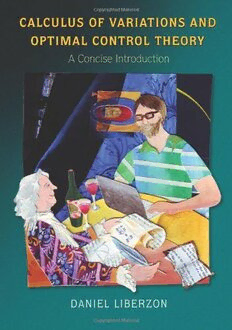Download Calculus of Variations and Optimal Control Theory: A Concise Introduction PDF Free - Full Version
Download Calculus of Variations and Optimal Control Theory: A Concise Introduction by Daniel Liberzon in PDF format completely FREE. No registration required, no payment needed. Get instant access to this valuable resource on PDFdrive.to!
About Calculus of Variations and Optimal Control Theory: A Concise Introduction
This textbook offers a concise yet rigorous introduction to calculus of variations and optimal control theory, and is a self-contained resource for graduate students in engineering, applied mathematics, and related subjects. Designed specifically for a one-semester course, the book begins with calculus of variations, preparing the ground for optimal control. It then gives a complete proof of the maximum principle and covers key topics such as the Hamilton-Jacobi-Bellman theory of dynamic programming and linear-quadratic optimal control. Calculus of Variations and Optimal Control Theory also traces the historical development of the subject and features numerous exercises, notes and references at the end of each chapter, and suggestions for further study.Offers a concise yet rigorous introduction Requires limited background in control theory or advanced mathematics Provides a complete proof of the maximum principle Uses consistent notation in the exposition of classical and modern topics Traces the historical development of the subject Solutions manual (available only to teachers)Leading universities that have adopted this book include: University of Illinois at Urbana-Champaign ECE 553: Optimum Control Systems Georgia Institute of Technology ECE 6553: Optimal Control and Optimization University of Pennsylvania ESE 680: Optimal Control Theory University of Notre Dame EE 60565: Optimal Control
Detailed Information
| Author: | Daniel Liberzon |
|---|---|
| Publication Year: | 2011 |
| ISBN: | 9780691151878 |
| Pages: | 254 |
| Language: | English |
| File Size: | 1.559 |
| Format: | |
| Price: | FREE |
Safe & Secure Download - No registration required
Why Choose PDFdrive for Your Free Calculus of Variations and Optimal Control Theory: A Concise Introduction Download?
- 100% Free: No hidden fees or subscriptions required for one book every day.
- No Registration: Immediate access is available without creating accounts for one book every day.
- Safe and Secure: Clean downloads without malware or viruses
- Multiple Formats: PDF, MOBI, Mpub,... optimized for all devices
- Educational Resource: Supporting knowledge sharing and learning
Frequently Asked Questions
Is it really free to download Calculus of Variations and Optimal Control Theory: A Concise Introduction PDF?
Yes, on https://PDFdrive.to you can download Calculus of Variations and Optimal Control Theory: A Concise Introduction by Daniel Liberzon completely free. We don't require any payment, subscription, or registration to access this PDF file. For 3 books every day.
How can I read Calculus of Variations and Optimal Control Theory: A Concise Introduction on my mobile device?
After downloading Calculus of Variations and Optimal Control Theory: A Concise Introduction PDF, you can open it with any PDF reader app on your phone or tablet. We recommend using Adobe Acrobat Reader, Apple Books, or Google Play Books for the best reading experience.
Is this the full version of Calculus of Variations and Optimal Control Theory: A Concise Introduction?
Yes, this is the complete PDF version of Calculus of Variations and Optimal Control Theory: A Concise Introduction by Daniel Liberzon. You will be able to read the entire content as in the printed version without missing any pages.
Is it legal to download Calculus of Variations and Optimal Control Theory: A Concise Introduction PDF for free?
https://PDFdrive.to provides links to free educational resources available online. We do not store any files on our servers. Please be aware of copyright laws in your country before downloading.
The materials shared are intended for research, educational, and personal use in accordance with fair use principles.

